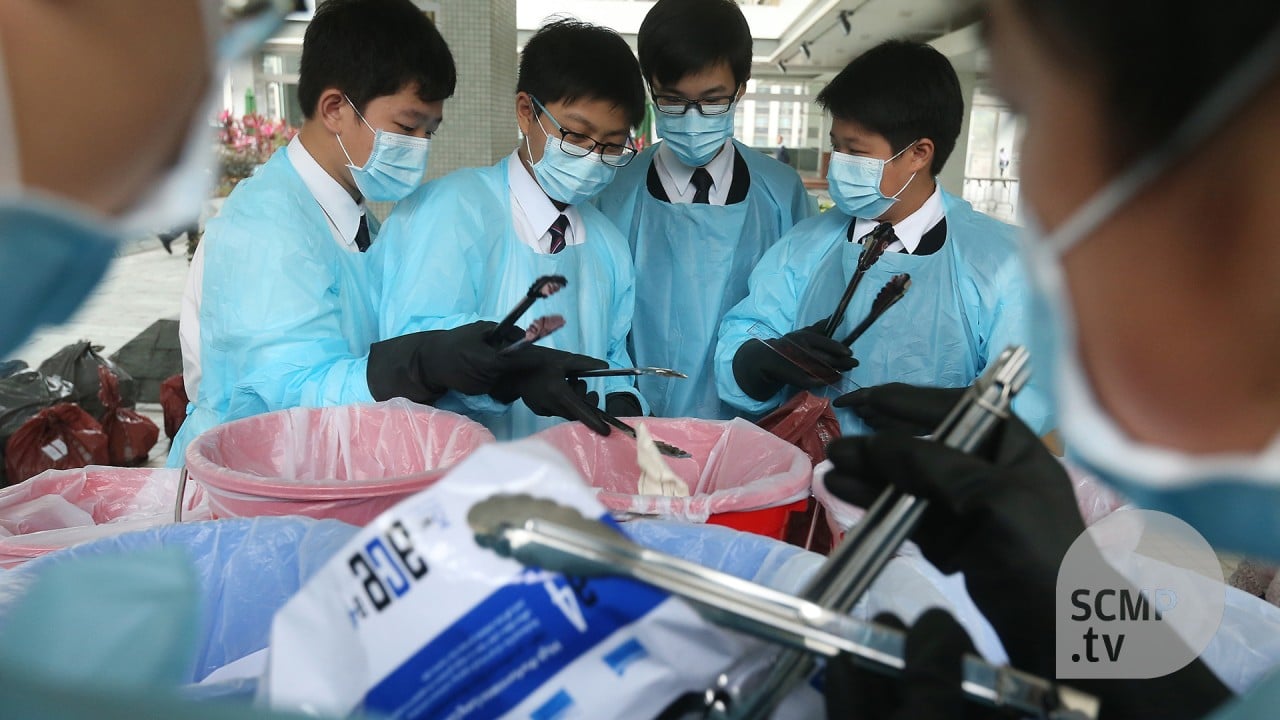
Hong Kong must expand recycling efforts if waste-charging scheme is to help bring down overall level of trash, experts say
- Environmental experts urge government to improve recycling system to make it easier for residents to cut down on waste
- Official admits there will be ‘challenges’ in lead-up to implementation of charging scheme, which is slated to begin in second half of 2023
Hong Kong must expand its recycling efforts if authorities want a new law charging residents for their rubbish to bring down the overall level of trash, environmental experts have said.
While authorities had pledged to increase funding for recycling to HK$1 billion (US$128.6 million) in 2023, one of the biggest hurdles to an effective programme remained food waste, they warned on Monday.
Officials from the Environmental Protection Department acknowledged last week that residents had a “lack of trust” in the recycling system and admitted implementing the waste-charging scheme would be a challenge. But the 18-month run-up would be time enough to get ready, they argued.

Green groups criticised lawmakers over the long lead time they incorporated into the waste-charging legislation and passed last month, some 16 years after the scheme was first proposed.
According to Luk, the department needed the year and a half to make the necessary arrangements such as carrying out an open tender for the manufacture of the designated plastic bags, setting up the points of sale and educating residents on the new process.
Under the scheme, the bags that residents and operators of street-level shops using government refuse collection services must buy will be available in 11 sizes and priced at 11 cents per litre.
A 15-litre bag, roughly the size of what supermarkets offer, will cost HK$1.70 each, while the 10-litre one will be HK$1.10. It is estimated the scheme will cost the average household between HK$33 and HK$51 a month.
But experts warned that the government would need to improve the recycling system to make it easier for residents to reduce their overall amount of waste.
“It’s not the end of the story. Implementing only the waste charge will not be able to achieve [the government’s] goal of reducing the amount of trash dumped,” said Baptist University’s Dr Chung Shan-shan, director of the environmental and public health management programme.
“They will have to really strengthen the city’s recycling network to cover every single type of recyclable – from food waste to all other types of dry recyclables.”
Luk said the government would increase the budget for recycling to at least HK$1 billion in 2023. About HK$998 million had been allocated to waste reduction and recycling work in the budget for 2019 to 2020.
The department will also boost the number of recycling stations from nine to 11, while recycling “convenience stores”, which already cover all 18 districts, will be increased from 22 to 32.

The city had 100 mobile collection points mostly located in housing areas with no recycling collection, Luk said. Along with the convenience stores, these mobile points had boosted the amount of recycling by 2.5 times to 4,500 tonnes from October 2020 to this June, compared with the eight-month period before, he said.
Hong Kong’s recycling rate has been flagging in recent years, hovering at just 29 per cent of the 15,637 tonnes of municipal solid waste sent to landfill in 2019, which includes domestic, commercial, industrial and construction waste. In 2010, more than half of the city’s waste was recycled.
But Hahn Chu Hong-keung from The Green Earth argued the point of the recycling convenience stores was “mainly to clean up the image of recycling”.
“But really, they are not enough to help improve the city’s recycling rate,” he said.
Chu agreed with the department’s current strategy of locating mobile collection points at older residential areas with no recycling, but also called on the government to step up collection for other types of waste.

01:42
Schooled in rubbish: Hong Kong students learn the basics of recycling, re-using and reducing their garbage
The government should expand a centralised plastic collection system to every district before the end of the preparation period and also explain when it intended to expand food waste collection to residential areas, he said.
“Right now they are only taking care of the restaurant industry, but to be fair, they will have to collect it from houses too,” Chu said.
Authorities should aim to collect at least half of food waste, which at 30 per cent was the largest component of municipal solid waste, to bring Hong Kong’s rate in line with other international cities, he argued.
Both Chung and Chu said the bag charges would need to be reviewed to ensure the prices incentivised more people to cut down on their amounts of trash. Lawmakers had been largely opposed to charging residents, and the department had agreed it would give out free bags to residents, particularly underprivileged ones, for a certain length of time.
Residents receiving welfare were also eligible for a HK$10 subsidy each month to cover the new expense, Luk said.
Nearly 70 per cent of Hongkongers back waste-charging scheme, survey finds
Chu suggested smaller 3- to 5-litre bags could be priced at 70 to 80 per cent of the 11-cent charge to help poorer families, while the larger bags should instead be more expensive, so wealthier residents who used them to throw out large amounts of rubbish would better feel the bite of the cost.
Chung warned that giving out free bags could lead to residents selling any extra bags they had. The subsidies were enough to cover underprivileged families, she said, while still encouraging them to reduce waste.
“All environmental taxes will affect the poor. To everyone else, the 11 cents per litre is a negligible fee,” Chung said. “Waste reduction will take sacrifices. If the charges aren’t increased, the city’s middle class and above won’t feel a thing.”


